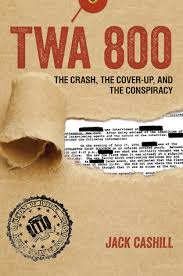Where the Vichy Weekly Standard Went Wrong
![]()

Order Jack Cashill's latest book, TWA 800: The Crash, the Cover-Up, and the Conspiracy
![]()

About Silenced: Flight 800
and the Subversion
of Justice (DVD) -
-Buy the Silenced DVD-
![]()
© Jack Cashill
December 20, 2018 - WND.com
On June 6, 2001, my partner James Sanders and I staged a pre-screening of our TWA 800 documentary “Silenced”for a tough audience, the Kansas City “hangar” of an organization known as the “Quiet Birdmen.”
There were close to a hundred people in attendance, the great majority of them retired airline, military, and freight pilots with a heavy TWA representation.
They sat in silence through the hour-long presentation. I did not know quite what to expect in the way of response, but when the lights came up, one gentleman rose angrily from his seat and shouted, “Follow the money!”
If anyone in the room doubted that missiles had destroyed TWA 800, he kept his opinion to himself. Offered instead were corroborating details, particularly from angry TWA pilots, about the money trail and the inexplicable Pentagon visits of then TWA CEO Jeff Erickson. Said one TWA pilot: “90 percent of us believe there was a government cover-up.”
The response we got from people within Boeing was equally encouraging. One engineer who had spent countless hours analyzing the aircraft’s destruction on the company’s Cray Supercomputers e-mailed me.
The message: “I brought [Silenced] to work today and showed it during lunch to eight of my fellow Boeing workers. The room was deathly quiet the entire time.... My impression then was a missile strike, and it is even more so today.”
Encouraged by the reception from aviation professionals, I sent a copy of “Silenced” to Claudia Anderson, the managing editor of the Weekly Standard. Launched in 1995 by Rupert Murdoch’s News Corporation, the Weekly Standard was arguably America’s most influential and best-written conservative publication.
A year or so before we made “Silenced,” the Weekly Standard accepted one of my articles for publication and assigned me a few more articles after that. I confess to having been flattered.
Anderson invited me to stop by their offices if I were in Washington, and one day I took her up on her offer. Although a bit frosty and patrician—think of the Sigourney Weaver character in “Working Girl”—Anderson was polite enough.
She even invited me to meet the magazine’s rising star, David Brooks. Two years later, Brooks showed the way forward for Vichy conservatives by jumping to the New York Times .
There Brooks would memorably write of Obama, “I remember distinctly an image of--we were sitting on his couches, and I was looking at his pant leg and his perfectly creased pant, and I’m thinking, a) he’s going to be president and b) he’ll be a very good president.” He was half right.
Given the Weekly Standard’s oversized influence in the Bush administration, I was actually hopeful that its editors would see the political potential in a still fresh Clinton scandal. I had a lot to learn.
Not hearing back from Anderson, I called to see if she had had a chance to watch “Silenced.” She claimed she tried but fell asleep while watching it.
Taken aback, I suggested she watch it all the way through, this being the greatest untold story of our time, one with major political implications. She doubted she would. She didn’t.
I sensed correctly that my relationship with the Weekly Standardwas over. In Washington, at least, I had crossed the line from responsible journalist to conspiracy theorist, evidence be damned.
In 2008, I tried Anderson again. In September of that year, I stumbled on the very real possibility that Bill Ayers helped the man with the “perfectly creased pant” write his acclaimed memoir, “Dreams from My Father.”
In the fall of 2008, it mattered that Obama maintained an intimate working relationship with a self-described communist whose acts of violence made him a pariah beyond Chicago’s left wing circles. This revelation would have shown Obama to be liar and literary fraud of epic proportion.
TWA 800, I understood, could intimidate those not prepared to spend countless hours poring through evidence they did not understand. My authorship thesis, however, involved no eyewitnesses or radar data or ballistics tests.
No one would have to leave his or her D.C. desk. All the evidence lay between the covers of a half-dozen or so books, two ostensibly by Obama and the rest by Ayers. I was not asking the Weekly Standard to buy my thesis sight unseen but to kick the tires and take it for a test drive.
With the best literary department of any conservative publication, the Weekly Standard had the chance to expose a literary scandal even more politically significant than JFK’s bogus Pulitzer for “Profiles In Courage.”
To prove my thesis I needed space, at least 3500 words. Anderson referred me to the magazine’s literary editor, Philip Terzian.
Replied Terzian: “An interesting piece, but I’m rather oversubscribed at the moment, the length is considerable, and cutting would not do it justice. (Also, we had a long, rather critical, piece on Obama’s oeuvre not too long ago.) So permit me to decline with thanks for allowing me take a look.”
Oeuvre?
A cover story that read, “Who Wrote Dreams From My Father,” in a major publication like the Weekly Standard could have shaken up the election, maybe even turned it. Dang those space limitations!
To be fair, other than the National Review’s Andy McCarthy, not a single conservative writer in the Bos-Wash corridor dared to comment on my thesis before the election.
The fear of being thought less than respectable paralyzed the Vichy right in 2008. And nowhere was that fear greater than at the Weekly Standard.
When Donald Trump won the Republican nomination in 2016, the collabos at the Weekly Standard had to make a public choice between being respectable or being conservative.
They chose respectable. Buh-bye.


